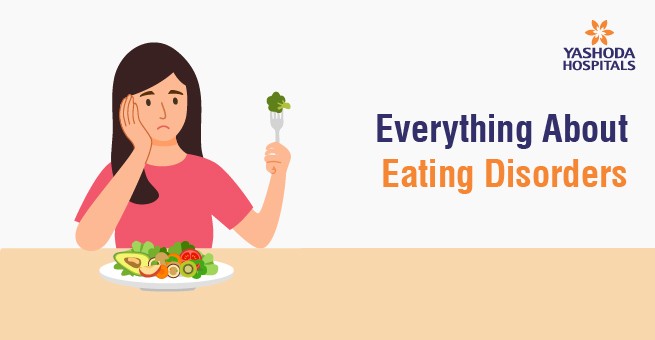
Everything About Eating Disorders: Types, Causes, Symptoms, and Treatment
Eating disorders are serious mental conditions marked by persistent disturbances in eating or behavioral patterns that considerably impair overall physical and mental health. The most commonly seen eating disorders in the majority of people are anorexia nervosa, binge-eating disorder, and bulimia nervosa. Anyone, regardless of age, gender, ethnicity, or socioeconomic status, can be affected by any of these disorders.
Types of Eating Disorders
- Anorexia Nervosa: A severe restriction in food consumption, a distorted body image, and a crippling dread of gaining weight are all characteristics of this form of the eating disorder. Anorexic people may weigh abnormally less, often lower than what is thought to be healthy for someone their age and height.
- Bulimia Nervosa: This eating disorder is characterized by binge eating, followed by compensatory measures that include fasting, excessive exercise, or forced vomiting. Although people with bulimia may have a normal body weight, their binging and purging behaviors can cause significant weight changes.
- Binge Eating Disorder: It is a type of eating disorder identified by recurrent bouts of excessive overeating that are followed by feelings of disgust, guilt, or humiliation. Even when they are not hungry, people who have binge eating disorder frequently consume much food in a short span of time.
- Other Specified Feeding or Eating Disorder (OSFED): People who do not fully fit the criteria for anorexia nervosa, bulimia nervosa, or binge eating disorder fall under the OSFED group of eating disorders. Those who fit within this category might have some of the symptoms of those disorders, but not enough to fully match the diagnostic standards.

Causes of Eating Disorders
Eating disorders are complex conditions that can have multiple causes. The following are some risk factors for developing an eating disorder:
- Genetics: Eating disorders could have a genetic component. According to studies, individuals with a family history of eating disorders are likelier to experience an eating disorder.
- Environmental aspects: The development of eating disorders can be influenced by a number of environmental factors, including cultural pressures to adhere to a certain body type, societal emphasis on thinness, and media portrayals of "ideal" body types.
- Psychological factors: Eating disorders and psychological factors like low self-esteem, perfectionism, anxiety, and depression are frequently linked together.
- Life events: Traumatic life events, such as sexual, physical, or emotional abuse, might lead to the development of eating disorders.
Symptoms of Eating Disorders
Depending on the type of disorder, the symptoms of eating disorders can vary. Some common symptoms, regardless of the severity of the eating disorders, include:
- Preoccupation with food and weight: Those who suffer from eating disorders may be preoccupied with thoughts of food, weight, and body image.
- Restriction of food intake: Individuals who suffer from anorexia nervosa may seriously limit their food consumption, which can result in considerable weight loss.
- Behaviors of binging and purging: Individuals with bulimia nervosa may experience episodes of binge eating, followed by purging actions like vomiting or using laxatives.
- Eating in secret: Many who struggle with binge eating disorder may consume a lot of food secretly because they feel ashamed or guilty about their eating habits in public.
- Excessive exercise: Individuals who struggle with eating disorders may overwork themselves in an effort to lose weight or burn calories.

Treatment of Eating Disorders
Treatment for eating disorders is available, and successful recovery depends on early intervention. A combination of medical, psychological, and nutritional support may be used in treatment, including:
- Medical Management: Hospitalization may be necessary for those with severe eating disorders in order to address physical issues and offer medical stabilization.
- Psychological Therapy: Cognitive-behavioral therapy (CBT) is a widely utilized method that aids people in recognizing and altering their unfavorable dietary and weight-related thought patterns and behaviors.
- Nutritional Therapy: Individuals receiving nutritional therapy for eating disorders learn how to have a healthy relationship with food and the value of a well-balanced diet for their physical and mental health.
Let us take a look at what our expert has to say,
Are You a Victim of Diet culture? | Yashoda Hospitals
Are You Suffering From Any of the Above Symptoms?
Appropriate treatment is necessary, as it ensures that your life goes on as normally as possible. Given the potentially life-changing consequences of treatment, it is always critical to seek a second opinion from a medical professional.
Get a free expert second opinion from Yashoda Hospitals.
Share your thoughts in the comments section below and let us know what you'd like to see in our next week's newsletter.
If you liked it, please share this edition with your friends and family.
Psychiatrist (FCPS Psych Gold-medalist )
1y#anorexianervosa https://youtu.be/QnUd9FPE06I